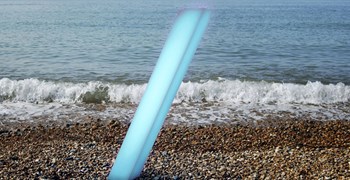A land artist has created a solstice work in his 55-acre intergalactic artland in rural Scotland
This article originally appeared on Culture24.
In the centre of an extraordinary 55-acre Scottish artland he created, artist and landscape designer Charles Jencks has made a new mosaic for a three-day solstice festival. It’s inspired, he says, by life, death, earth and the sun
 © Kim Ayres
© Kim AyresWe started off just saying, ‘what are its qualities?’ Well, we found 2,000 boulders and so we didn’t want to bury them. We used them to create this north-south line and these galaxies and then, finally, the multiverse.
The landscape itself is incredible because we’re in a bowl, basically a 360-degree circle, and when you get to the top you can see the mountains and large hills around us. It’s so inspiring to see meadows and cows, mountains, a desert, which we’ve kept, and the rainforest.
 © Kim Ayres
© Kim AyresAround the sun, comets come every 80 years ago. Around the side of the hills we have five sets of seats, which are the comets. That’s an idea connecting the sun and the comets.
For Earth, there is no greater agency than the sun, giving us warmth and much else besides. Its great giveaway is energy – the earth lives off one-trillionth of this gift – and all the necessities for photosynthesis and growth we need.
 © Colin Hattersley
© Colin HattersleyThis shield is in the shape of a double donut. Such invisible magnetism surrounds the earth, channelling the killer particles to the north and south poles as the aurora borealis, turning them into a stunning atmospheric dance we can see on certain nights.
Solar flares plus Earth shield equals visual beauty. The sun is less a warrior god and more a tender woman who pulls the earth along in warming, changing wave-forms.
 © Kim Ayres
© Kim AyresThat comes from the universe, which comes from the multiverse. It’s a sequence of these land forms and cosmic events.
Crawick is 55 acres. You can see these destroyed sites are an opportunity for renewal and to turn them into something positive. It’s wonderful to see this park used in different ways.
 © Alex Rigg
© Alex RiggIt’ll take time to get there but I’m sure it’ll be used in thousands of different ways we can’t predict. All successful parks have to bed themselves in with the locals who will use them in new ways.
They become a mixture of entertainment, picnics, walking the dog, exercise…there are many ecological projects you could do here. The great thing about nature and the park is you can have it going on for different people in different moods.
Lovers will come here, young children will slide down the mounds, people will misbehave. You can in a park. That’s okay.”
- The Crawick Multiverse Solstice Festival runs June 24-26 2016. Landscape of Waves, a collaboration in wave forms by Charles Jencks and Alex Rigg, is at the Merz Studio, Queen’s Road, Sanquhar from June 25 – September 5 2016. Open 11am-5pm (closed Monday), admission £2 (free for under-12s), call 01659 50514. Follow Crawick Multiverse on Twitter and Facebook.
What do you think? Leave a comment below.
Three places to enjoy the great outdoors in Scotland
Scottish National Gallery of Modern Art, Edinburgh
Set in extensive parkland, visitors can discover sculpture works by important artists like Ian Hamilton Finlay, Henry Moore, Rachel Whiteread, Richard Long and Nathan Coley. The lawn to the front of Modern One was re-landscaped in 2002 to a design by Charles Jencks.
Jupiter Artland, Wilkieston
A nominee for this year's Museum of the Year prize, the garden here is one of discovery - an earthwork here, a copse of cradled rocks there, the entrance to a fathomless burrow right before your feet. A map is provided but there are no set routes.
St Andrews Botanic Garden, Fife
About 8,000 species of ferns, herbaceous plants, shrubs and trees are grown here. Some are native to Scotland but most grow wild in other regions of the world.












